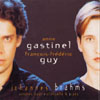Brahms Cello Sonatas
Though not quite in the Rostropovich/Serkin league, this reading on a superior recording is still well worth its full price
View record and artist detailsRecord and Artist Details
Composer or Director: Johannes Brahms
Label: Valois
Magazine Review Date: 5/2000
Media Format: CD or Download
Media Runtime: 52
Mastering:
DDD
Catalogue Number: V4817

Tracks:
| Composition | Artist Credit |
|---|---|
| Sonata for Cello and Piano No. 1 |
Johannes Brahms, Composer
Anne Gastinel, Cello François-Frédéric Guy, Piano Johannes Brahms, Composer |
| Sonata for Cello and Piano No. 2 |
Johannes Brahms, Composer
Anne Gastinel, Cello François-Frédéric Guy, Piano Johannes Brahms, Composer |
Author: DuncanDruce
A notably well-recorded set: cello and piano are finely balanced, the sound is warm, yet, crucially for Brahms, the bass remains clear and well defined. Gastinel and Guy perform with a feeling of intense engagement; they're particularly successful at maintaining a sense of direction when Brahms is thinking in long paragraphs - in the first movement of Op 38, for instance. Indeed, their approach suits nearly everything in these two sonatas - in Op 99 the Allegro passionato Scherzo is impressively stormy, and in the opening Allegro their full-blooded approach captures perfectly the very Brahmsian mood of strenuous elation.
The duo's playing of this sonata's Adagio is persuasive, too - it's only when you hear it alongside Isserlis and Evans, who suggest a more serene mood between the passionate outbursts, or Serkin's and Rostropovich's more profoundly characterised expression (at a slower tempo) that you realise this is a comparatively superficial account. The Allegretto middle movement of Op 38 doesn't quite have the minuet-like grace of some other versions, but this is a small blemish in the context of their performances as a whole. I do wish, though, that Anne Gastinel didn't display the mannerism, common among modern string players, of pressing each note in a smooth phrase, abandoning the true legato that Brahms surely intended at places like 3'57'' on track 4.
In the end, then, I'm not tempted away from Rostropovich and Serkin - their inspired probing of all the emotional nuances has a spellbinding effect - but Gastinel and Guy's highly charged playing, plus a superior recording, make this a very recommendable issue.'
The duo's playing of this sonata's Adagio is persuasive, too - it's only when you hear it alongside Isserlis and Evans, who suggest a more serene mood between the passionate outbursts, or Serkin's and Rostropovich's more profoundly characterised expression (at a slower tempo) that you realise this is a comparatively superficial account. The Allegretto middle movement of Op 38 doesn't quite have the minuet-like grace of some other versions, but this is a small blemish in the context of their performances as a whole. I do wish, though, that Anne Gastinel didn't display the mannerism, common among modern string players, of pressing each note in a smooth phrase, abandoning the true legato that Brahms surely intended at places like 3'57'' on track 4.
In the end, then, I'm not tempted away from Rostropovich and Serkin - their inspired probing of all the emotional nuances has a spellbinding effect - but Gastinel and Guy's highly charged playing, plus a superior recording, make this a very recommendable issue.'
Discover the world's largest classical music catalogue with Presto Music.

Gramophone Digital Club
- Digital Edition
- Digital Archive
- Reviews Database
- Full website access
From £8.75 / month
Subscribe
Gramophone Full Club
- Print Edition
- Digital Edition
- Digital Archive
- Reviews Database
- Full website access
From £11.00 / month
Subscribe
If you are a library, university or other organisation that would be interested in an institutional subscription to Gramophone please click here for further information.




